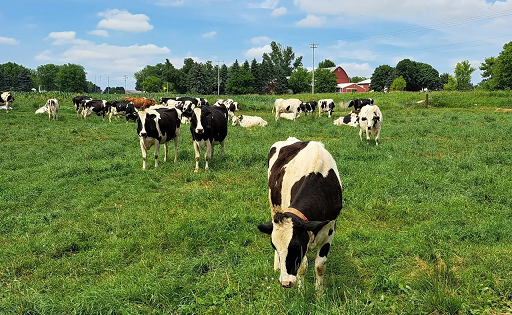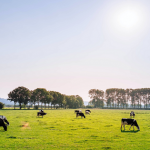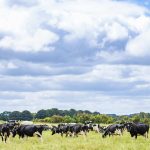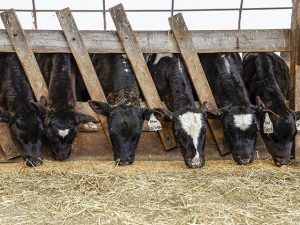
When a leader in the Thailand government was looking for expertise on how to reinvigorate her country’s dairy industry, she reached out to the University of Wisconsin-Madison and officials in the Department of Animal and Dairy Sciences.
Her Royal Highness Princess Maha Chakri Sirindhorn of Thailand, following the lead of her late father, King Bhumibol Abulyadej, connected with UW-Madison Chancellor Jennifer Mnookin last summer to see if a link might be made between her country and the dairy experts in Madison.
The king initiated dairy farming in Thailand decades ago to promote milk for good health and to introduce a new career for Thai farmers. The initiative was well received when it was launched, but now the princess believes the country’s dairy systems need to be reviewed and potentially improved.
The monarchy is the constitutional form of government in Thailand.
Jennifer Kushner, director of CALS Global within the College of Agricultural and Life Sciences at UW-Madison, traveled with Mnookin to Thailand in June 2024 and became familiar with the Thai leads tasked with shepherding the new dairy initiative.
Over the summer and fall, Kushner met virtually with partners and brought in dairy experts from the Department of Animal and Dairy Sciences (ADS). That prompted a return trip to Thailand in February, led by a team that included Kushner and Julia Frangul from CALS Global, Victor Cabrera and Luiz Ferraretto from ADS, Brian Luck from the Department of Biological Systems Engineering, and David Jaramillo from USDA.
The team visited farms and cooperatives, met with Thai and U.S. Embassy officials, participated in a conference on climate-smart agriculture, and began a collaboration that UW-Madison officials believe will be a long-term partnership with the country.
Cabrera, an ADS professor and Extension specialist in dairy farm management, believes Thai farmers and others have a lot to learn about ways to enhance their dairy industry.
“They have a lot of challenges, but my impression from being there is the people are heavily committed,” Cabrera says. “What we saw gave us the impression that there is a lot of potential improvement that could be made. They are learning at a fast pace.”
Thailand, a country of about 72 million people that is about three times larger in size than Wisconsin, has 15,800 dairy farms that milk an average of 36 cows per farm. The number of farms is decreasing at a significant rate, officials there say, and cows produce only about a third as much milk as what is produced on the average U.S. dairy farm.
One of the biggest challenges Thai dairy farmers face is the heat. Cabrera and Ferraretto say daytime temperatures were above 90 degrees F when the Wisconsin contingent visited, and early February is considered late winter. Temperatures are even hotter in the summer.
“The cows we saw were suffering from heat stress, and we didn’t see any abatement systems to address it,” Cabrera says. “One of the big problems is the temperature doesn’t cool that much at night, so the cows don’t have an opportunity to rest from the heat.”
Ferraretto, an ADS assistant professor and Extension specialist in ruminant nutrition, says one area Thai officials identified as having potential for improvement is feed production and nutrition. He went on the trip to evaluate that aspect of the Thai dairy industry.
The types and quality of feed are considerably different in Thailand as compared to Wisconsin, Ferraretto says, with napier grass, also known as elephant grass, one of the staples in the dairy diet. Thai farmers often feed byproducts from vegetables and fruits such as cassava, almonds, citrus, soybeans, potatoes and other agro-industrial byproducts.
“In my opinion, their low milk production is in direct correlation to the amount and quality of feed the animals are receiving,” Cabrera says.
The dairy animals the Wisconsin delegation saw were Holsteins, but Brown Swiss and Jerseys are also prevalent in the country, along with a mix of local breeds and crossbreds.
Imported genetics
Cabrera says Thai farmers have improved their herds by using imported genetics, but there is still a long way to go.
“Officials there said Thai farmers are planning on importing genetics from Australia and New Zealand, but as a group we are seeing if we can advise them differently,” he says. “Cattle breeds from those countries would not be the best for them to bring in and use.”
Cabrera says Thai officials hope to shore up dairy production in Thailand before a free-trade agreement is expected to be signed with the European Union later this year, which would potentially open the door to low-priced imports.
“They are concerned that greater competition from external production could harm the dairy industry in Thailand,” he says.
“It’s very obvious to me that they are in need of good Extension work,” Ferraretto says. “I think our skills and experience here give us a lot of flexibility to help them develop their dairy industry. I see a lot of opportunities. There are multiple levels that we could collaborate with them.”
He says the Wisconsin experts likely will offer strategies to store feed in a different way so feed quality doesn’t diminish as much.
Cabrera says providing information on milking protocols to reduce mastitis infections is another thing the Wisconsin officials will do.
“We believe a big part of this project will involve Extension work and dissemination of information,” he says. “Luiz and I have experience in creating programs like this. There is a structure in place with the cooperatives to do this work faster and easier [than working with individual farmers]. Once we find out the proper channels of communication and ways to work with them, I think we will get along very well.”
Kushner says she was not involved in the initial discussions with the royal family but was contacted when it was clear the primary interest of the collaboration was focused on dairy. “Since my office supports international engagement, it was the obvious place to start,” she says.
International UW alumni chapters
Kushner, Ferraretto and Cabrera were impressed by the robust involvement of the UW alumni organization in Thailand. UW-Madison has 13 active international alumni chapters, including six in Southeast Asia.
“The alumni chapter that helped organize our on-the-ground experience [Wisconsin Alumni Association of Thailand] was fantastic,” Kushner says. “There are more than 2,000 UW alums in Thailand. A fair number of them are highly placed in government and industry positions in Thailand, and they’re a very active chapter. A small group of those alums facilitated many of our meetings and the agenda we had. The lead of the technical team was an ADS alum.”
“We met some former government ministers, CEOs of large companies, some very influential people, all who were part of the alumni chapter,” Cabrera says. “These are people who came from Thailand to study in Madison. Most of them completed graduate programs at the UW. They are all back in Thailand but are very proud of being Badgers.”
Ferraretto was also impressed with the Wisconsin group’s interactions with the Thai group coordinating the information exchange. “They put a strong effort to meet with us and showcase everything,” he says. “One of the most interesting things was we had an opportunity to meet with Princess Sirindhorn. That was the kind of thing I never expected to do.”
“They were very receptive and very accommodating,” Cabrera adds. “They were trying to learn, and they are open to making a long-term commitment.
“This was the first step. They have a very different culture, and although I think we get along very well, sometimes we don’t understand the details of how the system works. We have much to learn, too.”
Members of the team anticipate visiting Thailand again, perhaps even later in 2025. A team from the Wisconsin Department of Agriculture, Trade and Consumer Protection, including Secretary Randy Romanski, is planning a visit to Thailand in early March, with Guilherme Rosa, ADS statistical genetics professor, representing CALS on that trip. Further meetings are planned to discuss next steps.
“I think it would be interesting for farmers to come here or students to come to our labs in the long term, but my guess is that in the short term, the interest is more for us to go over there,” Cabrera says. “I’m thinking we’ll finish some data gathering, put together a plan and move forward.”
Kushner says there was some discussion about building a dairy school in Thailand where ADS experts would continue to collaborate with Thai officials. The funding sources for activities such as that are still being developed, and could come from a mix of Thai, U.S. and other international sources.
She says the long-term relationship with Thailand could aid Wisconsin-based companies that might provide animal genetics or other agricultural products.
“My perspective is, we always get better at what we do by learning how things are practiced in another country,” she says.























